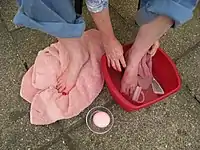footbath
English
WOTD – 18 April 2019
Etymology
Pronunciation
- (Received Pronunciation) IPA(key): /ˈfʊtbɑːθ/
Audio (Southern England) (file)
- (General American) IPA(key): /ˈfʊtbæθ/
- Hyphenation: foot‧bath
Noun
footbath (plural footbaths)
- The act of soaking or washing the feet.
- 1827 September 4, “Galvanism, Vaporbath, &c. [from the London Gazette of Health]”, in John G. Coffin, editor, The Boston Medical Intelligencer. Devoted to the Cause of Physical Education, and to the Means of Preventing and Curing Diseases, volume 5, number 16, Boston, Mass.: Printed and published by John Cotton, […], →OCLC, page 261:
- Besides the above auxiliaries, our author occasionally recommends topical bleeding, exercise, friction, footbaths, &c.
- 1835, William Hayley, “The Life of Cowper”, in T[homas] S[huttleworth] Grimshawe, editor, The Works of William Cowper: His Life and Letters […], volume I, London: Saunders and Otley, […], →OCLC, part 1, page 6:
- […] I [William Cowper] have been constant in the use of a hot foot[-]bath every night, the last thing before going to rest.
- 1839 May, C[harles] Morehead, “IX.—Report on the Measles which Prevailed Epidemically in the Central Schools at Byculla, during the Months of December 1838, January, February and March, 1839”, in Transactions of the Medical and Physical Society of Bombay, volume II, Bombay: Printed at the American Mission Press for Messrs. Collett & Co. […]; and sold by Mr. J. M. Richardson, […], →OCLC, page 188:
- Apply eight leeches to the top of the sternum and use a foot bath at bed time and repeat the castor oil on the following morning.
- 1892, Sebastian Kneipp, “Baths”, in My Water-cure: Tested for More than 35 Years and Published for the Cure of Diseases and the Preservation of Health […], authorized and complete English edition, Kempten, Bavaria: Jos. Kœsel publisher, →OCLC, part 1 (Applications of Water), page 42:
- The foot-baths are very useful in all cases where vigorous and cold remedies cannot well be used on account of weakness, fragility, want of vital warmth, etc.; as little or no reaction takes place, i. e. the cold water cannot produce sufficient warmth for want of blood.
- 1995, Doug Dollemore, Mark Giuliucci, Jennifer Haigh, Sid Kirchheimer, Jean Callahan, “Hydrotherapy: The Everyday Miracle of Water”, in Bill Gottleib, editor, New Choices in Natural Healing: Over 1,800 of the Best Self-help Remedies from the World of Alternative Medicine, Emmaus, Pa.: Rodale Press, →ISBN, page 78:
- Foot baths aren't just for tired, achy feet. Alternating hot and cold soaks is great for relieving swelling in the feet and legs. By diverting blood away from the affected areas, hot foot baths are used to relieve head and chest congestion and even menstrual cramps.
- 2013, Michaela Glöckler, Wolfgang Goebel, “Skin Diseases and Rashes”, in A Guide to Child Health: A Holistic Approach to Raising Healthy Children, 4th edition, Edinburgh: Floris Books, →ISBN, section 5.14 (Fungus Infections):
- After a quicker-than-usual shower or a short footbath in sage or oak bark tea, dry (or blow-dry) the affected areas and surrounding skin very thoroughly.
- A small basin or bath designed for soaking or washing the feet.
- 1833, P[ierre François Olive] Rayer, “Alterations of the Nails”, in William B. Dickinson, transl., Treatise on Diseases of the Skin; Founded on New Researches in Pathological Anatomy and Physiology. [...] Translated from the French, London: John Churchill, […], →OCLC, section II (Alterations of the Dependences of the Skin), § 790, page 355:
- [T]he portion [of the nail] which projects beyond the fingers or toes should be excised, so that it may not prevent the motions of the hands or feet. If the nail has no very considerable thickness, this may be done wit a pair of strong scissors, after it has been softened by the employment of the footbath.
- 2014 April, “Section Two: Practicing Biosecurity”, in Biosecurity Guide for Poultry and Bird Owners: Biosecurity for Birds (Program Aid; no. 1885), Washington, D.C.: Animal and Plant Health Inspection Service, United States Department of Agriculture, →OCLC:
- A footbath is a handy tool to help you practice backyard biosecurity. […] Ask visitors to walk through the footbath, wiping their feet on the mat. The mat scrubs their shoes a bit as they wipe them and applies the disinfectant.
- A liquid mixture, often medicinal, for soaking or washing the feet with.
- 1998, Stephanie Tourles, “Ingredients, Supplies, and Tools of the Trade”, in Pamela Lappies, Julia Rubel, editors, Natural Foot Care: Herbal Treatments, Massage, and Exercises for Healthy Feet, Pownal, Vt.: Storey Books, →ISBN, page 32:
- Rosemary essential oil can be used alone or in combination with thyme oil and sage tea in a deodorizing footbath that also helps relieve aching feet.
- 2005, “Foot-baths for Cattle”, in Edward Boden, editor, Black’s Veterinary Dictionary, 21st edition, London: A & C Black Publishers, →ISBN, page 278, column 1:
- A 5 per cent formalin foot-bath is often recommended for the control or prevention of foul-in-the-foot, but it is important not to exceed that strength or to put the cows through it too often.
Hyponyms
Translations
act of washing the feet
|
small basin or bath designed for washing feet
liquid mixture for washing the feet with
|
This article is issued from Wiktionary. The text is licensed under Creative Commons - Attribution - Sharealike. Additional terms may apply for the media files.

